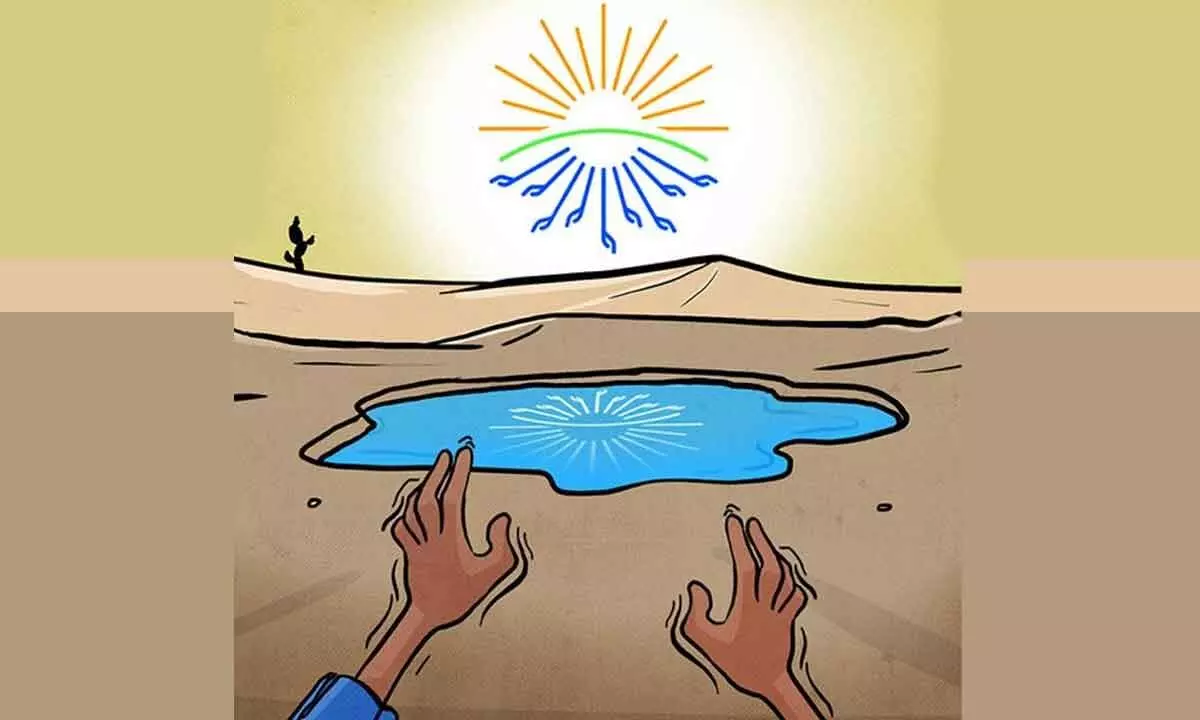Windows & mirrors to our souls

So much has the faculty of vision come to be associated with reality that, to say that seeing is believing is to say that the occurrence, or existence, of something, can no longer be doubted, as it has actually been seen. Trustworthy and totally reliable though they are, under normal circumstances, eyes can often create a deceptive impression in the mind. In a desert, for instance, a pool of water is sometimes imagined to be seen in the distance, a phenomenon called a mirage
As one ages, all organs need increased attention, and care, especially one’s eyes. The functioning of the eye has its limitations, just as that of the ears and the limbs has. The naked eye functions best when the intensity of light is compatible with its range, neither too bright nor too dark, as the eyes need to adjust to the intensity of the light. In the game of cricket, for instance, it is called getting one’s eye in.
So much has the faculty of vision come to be associated with reality that, to say that seeing is believing is to say that the occurrence, or existence, of something, can no longer be doubted, as it has actually been seen. Trustworthy and totally reliable though they are, under normal circumstances, eyes can often create a deceptive impression in the mind. In a desert, for instance, a pool of water is sometimes imagined to be seen in the distance, a phenomenon called a mirage, which is caused by the bending, or reflection, of light passing through layers of air having different temperatures.
A Chief Minister I worked with once asked me to focus on a certain number of things. Politely, but firmly, I had to tell him that focus invariably implied everything else getting blurred; as was in the case of Arjun, the Pandava warrior, who, in the epic Mahabharat was asked by his Guru, Dronacharya, to aim his arrow at the eye ball of a bird perched on the branch of a tree.
All philosophies and religions speak in praise of the quality of charity, and the value of donating to worthwhile causes. There can be no greater donation than that of one’s eyes; and now, it is possible to bequeath one’s eyes, as a donation, to causes such as science and medicine.
As we saw is last week’s piece, the word ‘eye’ is very versatile and lends itself to various usages. Government files for instance, are often labelled ‘For Your Eyes Only’, meaning that access is restricted to certain categories of persons. Interestingly, an ‘eye for an eye,’ similarly, is an expression from the Book of Exodus and stands for the principle of reciprocal justice or a measure for measure. And ‘eyeball to eyeball’ confrontation is a hostile, and aggressive, face-to-face like the one that took place between John Kennedy and Nikita Khrushchev in the Cuban crisis in the 1960s. The person who backs off first is said to have ‘blinked first’. An ‘eyewash’ is slang for something .which is deceptive or misleading, whilean ‘apparition’ is a ghost or a ghost like image.
Likewise, to ‘see things’ is to have hallucinations, and to be the ‘eyes and ears’ is to be trustworthy. The institution of the District Collector in Andhra Pradesh state, (also known as the District Magistrate or the Deputy Commissioner in some stares), for instance, functions as the very eyes and ears of the state government. To have a ‘roving’ eye, again, is habitually to have a sexual interest in people other than one’s partner. Interestingly enough, psychologists believe that people close their eyes, while kissing, as the brain finds it difficult to process another sense, while concentrating on visual stimuli.
Quite apart from the literal meaning, the ‘eye of the needle’ was the name of a narrow great way into Jerusalem; so-called, in view of its extreme narrowness and camels loaded with goods and riders had to be unloaded in order to pass through it. The analogy being that a rich man would have to similarly unload his material possessions in order to enter heaven.
People have eyes of different colours such as hazel, green, brown, black or blue. It is believed that brown stands for trustworthiness, hazel for a strong and determined personality, blue for sentimental, green for mysterious, grey for a reserved nature and stands for impulsive.
While it is natural for tears to form in the eyes on account of crying, artificial tears can also be created by using a substance called glycerin. This is often resorted to by actors in movies and plays while enacting emotional scenes. I remember doing that in a couple of movies, as a child actor; one in which the mother of the character I was playing dies, and the other, in which the father of the character I was portraying beats me after finding me begging in a bus stand, on account of hunger.
The eye and the functions it performs are mostly associated with pleasant and positive things. However, a superstitious belief, in what is called the ‘evil eye’, has persisted in most religions, across the world, from times immemorial. Malice and envy of prosperity and beauty are usually considered the causes. Many practices have been in vogue, across religions, cultures, and regions, as remedies for the impact of the evil eye.
After selection to IAS, I had to undergo the customary medical test organised by the Union Public Service Commission. S S Yechury, my brother-in-law, Chief Engineer at that time in the Union Ministry ofHealth, accompanied me. As Yechury carried his credentials on his person, no objection was raised to his accompanying me. One of the tests involved recognition of numbers, and pictures, formed by dots of different colours,in a book. Either on account of nervousness, or an innateinability to distinguish between certain types of colours, I fared miserably; both in that test, as well as in another one, in which I had to distinguish between beams of green, amber, and red colours aimed at my eyes. That was when Yechury’s cleverness and presence of mind kicked in. Pulling his rank, and relying on his expertise as an automobile engineer, he subjected the technician to perform the test to a grueling cross examination. The technician put up a brave front for some time, and then caved in, under the weight of Yechury’s incisive inquisition. I scraped through the test by the skin of my teeth, thanks to my brother-in-law!
The story goes that the most famous scientist in history, Albert Einstein, maintained two pairs of spectacles, one for normal use, and the other one, to look for the first, when misplaced!
(The writer was
formerly Chief Secretary,
Government of Andhra Pradesh)











